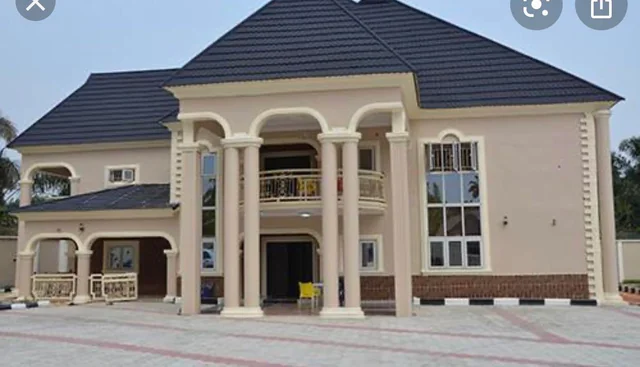A lot of Africans living abroad in developed countries are building retirement mansions in their countries of origin, but are they really enjoying these properties? Anecdotal evidence suggests that it is often the caretakers looking after the properties of those living abroad that become the true beneficiaries of these homes. Typically, in some countries like Nigeria, a person will erect a beautiful house back home while living abroad, and a caretaker will be employed to live in and watch over the house every day. The legal owner visits once a year for about 2-3 weeks to enjoy the property, but the caretaker enjoys it daily. Interestingly, caretakers benefit from the property as soon as it’s completed, when everything is fresh and beautiful. Meanwhile, the legal owner may only return home 10 or 15 years later, if fortunate, to enjoy what remains—after the style, taste, and beauty have all faded.
A typical retirement mansion in Nigeria
This is largely because society promotes the idea of building back home, even when one is never there, spending money on things far away, only for others to enjoy. Even for those not subscribing to minimalism, it’s hard to see any practical reason why a person with a family size of 3 or 4 would build a 9-bedroom house, leaving about 6 rooms empty all the time—occupied only by neglect. Such a large house is a waste, with unused rooms and high maintenance costs becoming a financial burden.
Just as no one would buy 10 doughnuts and eat only 3, throwing away the rest simply because they could afford them, the same logic applies to buildings. For instance, someone currently building a 12-bedroom house in their village has been working on it for 9 years. In the meantime, this person rents a small room in the US, planning to eventually return home to live in the mansion. Yet, with the slow pace of construction, it’s estimated that it will take at least 5 more years to complete, by which time the design will be outdated. This individual may never even live to enjoy the house.
Next Afropreneurs Summit to take place in Perth. visit: www.afropreneurssumit.com.au
In 2018, a 43-year-old man living in the US died of a heart attack in his sleep. He wasn’t found until three days later. This man had been renting a small room, working 16-hour days, 6 days a week, while pouring his earnings into building a 9-bedroom house back home. When he passed, his family sold the incomplete house, as it was too large for them to maintain.
Many workers abroad build large houses back home, motivated by the desire to impress others or show off, forgetting to live in the present. They believe they will one day, in their retirement years, return to enjoy these houses. But at 65 or over, battling the frailties of aging, there is little need for such extravagance. Who, at that age, will they be impressing? At that point, physical limitations and health challenges will make maintaining and enjoying such a property difficult, if not impossible.
Melbourne summit happening on 26 October 2024. visit www.afropreneurssumi.com.au to register
In Western societies, older people typically downsize, selling large homes to live in more manageable spaces. Yet, in some cultures, there is a tendency to live minimally during youth and splurge on grand homes when old age approaches. This approach overlooks the importance of living well now while prudently planning for the future. While it’s essential to invest in the future, it’s equally important to live a balanced and meaningful life today.
(This piece was originally written by an African living in the US. The article was sourced from the internet.)




